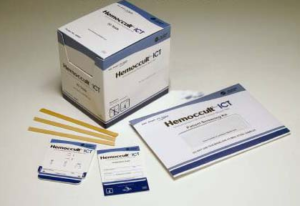FIT Test on Dual Stool Specimens for Occult Blood
POWERCHART ORDER – FIT Testing-Stool
Useful For
Hemoccult® ICT (Immunochemical Test) is a rapid, visually read, qualitative immunochemical chromatographic method for detection of human hemoglobin from blood in fecal samples. Fecal occult blood tests are useful screening aids for detecting primarily lower gastrointestinal (g.i.) disorders that may be related to iron deficiency anemia, diverticulitis, ulcerative colitis, polyps, adenomas, colorectal cancers or other g.i.lesions that can bleed. Hemoccult® ICT is recommended for use by health professionals as part of routine physical examinations or when lower g.i. disorders are suspected
Immunochemical fecal occult blood tests, such as the Hemoccult® ICT, are specifically designed to detect human hemoglobin in dried fecal samples. Hemoccult® ICT contains polyclonal anti-human hemoglobin antibodies that react with the globin portion of undegraded hemoglobin. Hemoglobin from upper g.i. bleeding (i.e., oral cavity, esophagus, stomach or small intestine) is generally degraded by bacterial and digestive enzymes before reaching the large intestine and is therefore rendered immunochemically non-reactive. Conversely, hemoglobin from lower g.i. bleeding (i.e., cecum, colon or rectum) undergoes less degradation and can therefore remain immunochemically reactive. Thus, immunochemical fecal occult blood tests which detect undegraded hemoglobin have increased biological specificity for lower g.i. bleeding and any associated pathology. Because Hemoccult® ICT is specific for human blood in feces, no special dietary restrictions are required. Immunochemical fecal occult blood test methods have improved specificity for the detection of lower g.i. disorders that bleed, including colorectal cancers and adenomas, and can lower the overall cost of detecting these disorders. All fecal occult blood tests are subject to certain limitations such as lesions that bleed intermittently and non-uniform distribution of blood in feces. Detection of occult blood is not always an indication of g.i. pathology.
Method Name
Immunochemical Test (ICT)
Aliases
Occult Blood,Hemoccult,guiac,fecal Occult Blood,occult Blood,fit Test,fit Testing Stool
Specimen Type
Hemoccult ICT cards consist of two tests, the cards are designed so patients can collect serial specimens at home from bowel movements over two days. After the patient prepares the test, it may be returned in person or by mail (use Hemoccult Mailing Pouch) to the hospital laboratory, or medical office for developing and interpretation.
DO NOT SEPARATE CARDS FOR INDIVIDUAL USE.
THERE MUST BE TWO CARDS WITH PROPERLY INNOCULATED STOOL SPECIMENS TO PERFORM PROPER TESTING.

Specimen Required
Two days of stool specimen on two Hemoccult COLLECTION cards
Specimen Minimum Volume
2 properly innoculated specimen collection cards.
Specimen Stability Information
Stable for 10 days at room temperature
Rejected Due To
- Only one card submitted for testing. (testing will only be performed if both cards are submitted.)
- 2 cards submitted with specimens collect collected on the same days
- Card not properly inoculated with stool specimen(s)
- Not transported at room temperature
- Received greater the 10 day old.
Performing Laboratory
Glens Falls Hospital Microbiology Laboratory
Reference Values
Negative
Day(s) and Time(s) Performed
- Day Shift
- 7 days per week
Analytical Time
2 days
Specimen Retention Time
Unable to retain once testing is complete
Analytical Time
2 days
